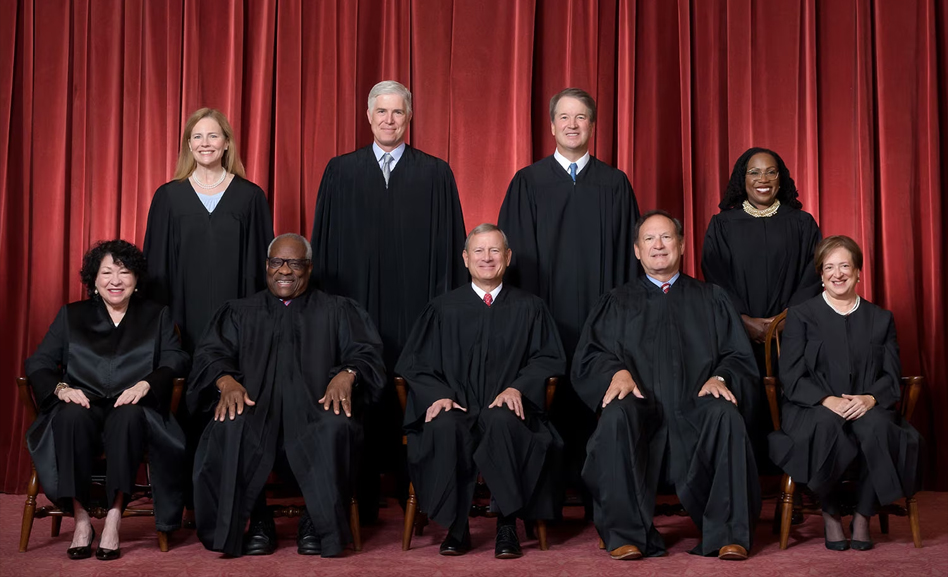
CHRISTOPHER KANE | The Washington Blade
Courtesy of National LGBT Association
The U.S. Supreme Court’s conservative supermajority ruled today (Friday, June 30), on the last day of Pride Month, in favor of Lori Smith, the graphic artist who did not want to make wedding websites for same-sex couples despite Colorado’s nondiscrimination law barring discrimination on the basis of sexual orientation.
“The First Amendment envisions the United States as a rich and complex place where all persons are free to think and speak as they wish, not as the government demands,” Justice Neil Gorsuch wrote in the majority 6-3 decision along ideological lines in 303 Creative v. Elenis.
The liberal justices and LGBTQ advocates, however, called the majority’s finding of a free speech exemption to nondiscrimination rules “unprecedented,” warning it would blow a hole through these laws and pave the way for anti-LGBTQ discrimination by businesses.
“Today the court, for the first time in its history, grants a business open to the public a constitutional right to refuse to serve members of a protected class,” Justice Sonia Sotomayor wrote in her dissent, joined by Justices Elena Kagan and Ketanji Brown Jackson.
The liberal justices argued the Colorado law targets conduct, not speech
“Today is a sad day in American constitutional law and in the lives of LGBT people,” Sotomayor wrote. “The immediate, symbolic effect of the decision is to mark gays and lesbians for second-class status.”
America’s largest LGBTQ organization, the Human Rights Campaign, issued a press release following the ruling: “Make no mistake, this case was manufactured by the Alliance for Defending Freedom to create a new license to discriminate against LGBTQ+ people,” the group wrote, referring to Smith’s legal team.
ADF is described by the Southern Poverty Law Center as an anti-LGBTQ hate group.
“Despite our opponents claiming this is a major victory, this ruling does not give unfettered power to discriminate,” HRC wrote. “This decision does not mean that any LGBTQ+ person can be discriminated against in housing, employment or banking — those protections remain enshrined with federal law.”
















Indeed this case was all about protecting speech and the freedom of religion. You can be a gay victim all day long and all night long, but at the end of the day, you can’t force another American to believe what you believe. We don’t have Thought Police, yet!
Besides, in a normal world, just go down the street to another cake baker. Do you really want to eat a cake from someone you just pissed off?
I hear the words protected class, entitled, and victim often in the gayborhood. Grow up! You don’t have extra special rights!
You’re a bigot and your religious freedom shouldn’t outweigh my right to exist. You’re fucking scum and the reason I am terrified about the future of this country. Fuck you. Go kick rocks.
Liberal open mindedness and “love over hate” on full display here. You made my point better than I could have ever hoped.
Perhaps you could use the F-bomb a little more on your next comment!
Gay Republicans are the worst kind of self hate
Suck our gay conservative cocks stupid cunt
Here we are a self-loathing liar, who claims to be conservative but in the real world, he is a scared little boy. Tries to bastardize anyone who is different than the norm. Pretends he is conservative but actually doesn’t know the meaning of the word. Conservative does not mean that you get to force your religious beliefs on everyone else. Not truly enlightened but a stooge for the straight white male who would and does shun him and his ilk at every opportunity. Conservative means that your beliefs are yours keep them in your house, get them out of mine. Pretends that he gets lowered taxes when he is just another middle-class fool who is paying the way for the top one percent to cheat. There has never been a balanced budget under a republican only once in recent years and that was Clinton.